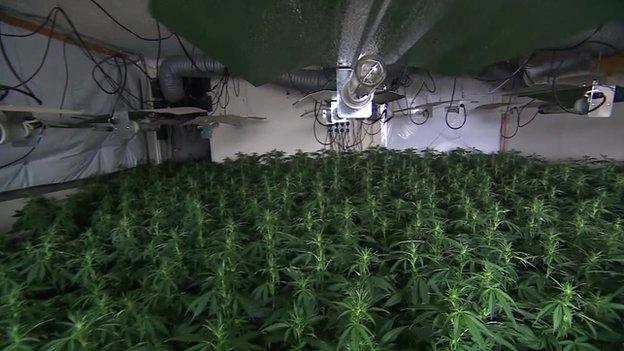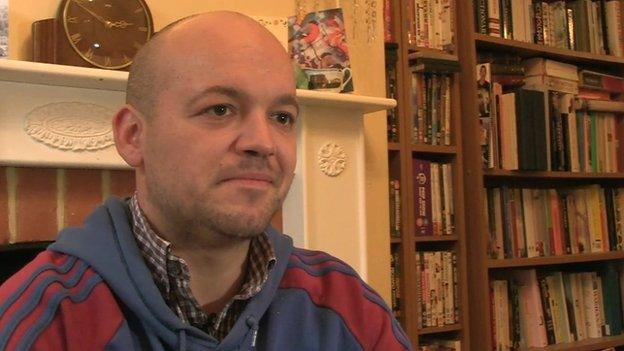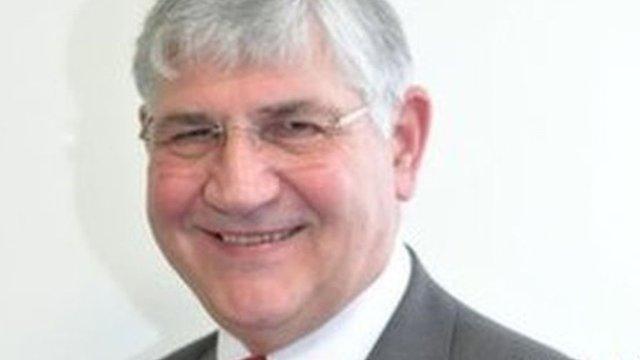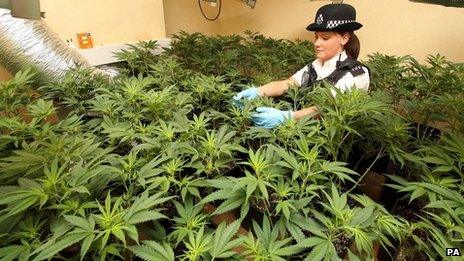17% drop in police raids on cannabis farms
- Published

The number of police raids on commercial cannabis farms has dropped by more than 17% in the last year, Freedom of Information figures suggest.
The 22 police forces that responded in full reported a fall in farms identified from 2,038 to 1,689.
Drug researchers say cuts mean less money for complex investigations and specialist resources like helicopters.
The National Police Chiefs' Council says the drugs market is complex and the fall is due to a number of factors.
The new figures were obtained through Freedom of Information requests sent by the Victoria Derbyshire programme to all 45 police forces in the UK. Of the 22 forces that sent full replies, 16 reported a fall in raids and detections.
Budget cuts
The Metropolitan Police recorded a drop from 203 to 140 farms identified from 2013/14 to 2014/15. Merseyside dropped from 613 to 504, Nottinghamshire from 162 to 124 and Humberside from 53 to 38.
There is no uniform definition of a commercial cannabis farm but it is described by the National Police Chiefs' Council (NPCC) as one with 25 plants or making use of sophisticated lights and hydroponic equipment.
The last official figures from the Association of Chief Police Officers (now the NPCC) showed the number of raids on commercial cannabis sites more than doubled between 2008 and 2012 as organised criminal gangs switched from importing the drug to growing it in the UK.
"Recent budget cuts appear to be reducing the amount of proactive policing that's going on," said Matthew Atha of the Independent Drug Monitoring Unit, who has worked as an expert witness in more than 1,000 cannabis-related cases.
"One of the main methods of detecting cannabis growers is police helicopters with infrared cameras and they cost a lot of money to keep in the air.
"Police are also less likely to be chasing the money in a network of financial dealers and investigating the people who are paying the principal targets."
The figures showing a fall in commercial cannabis raids come after Police and Crime Commissioner for Durham Ron Hogg said his force would stop arresting people growing the plant for their own use, while insisting it would continue to tackle commercial farms.

Case study

Ellis Corio was given a suspended sentence and community service at Norwich Crown Court earlier this year.
He started growing cannabis for his own use, gave some to friends, then met someone with criminal connections. He then rented a house where he started to grow the drug commercially to sell through dealers.
"You compare the sentencing you get for growing cannabis with other crimes - hard drugs, robbery -the kind of things people do to make a quick buck and it's very minimal for cannabis.
"The only real risk is getting robbed, because obviously you can't go to the police so you're an easy target - there's that element of danger.
"I respect most of the laws. But when you have someone telling you you can't do it and can't provide one decent argument other than the fact it's illegal, how are you meant to have respect for that?"

Last month, the chairwoman of the NPCC, Sara Thornton, also told the Victoria Derbyshire programme that police should prioritise organised crime gangs growing cannabis on "an industrial scale".
Ms Thornton previously served as chief constable of Thames Valley police when FOI data shows the number of commercial cannabis farms identified by her force fell from 97 in 2011/12 to 42 in 2014/15.
The NPCC is expected to publish new, official, research into the commercial cannabis market in September which, it says, will fully set out the nature and extent of the problem across the country.
It says the drugs market is complex and there are multiple factors that might explain the fall in cannabis farms identified by the police.
Changing tactics, for example, may mean organised criminals are hiding more cannabis factories underground to avoid police detection by helicopters fitted with heat-seeking cameras.
"We must acknowledge there has been a 25% reduction in funding for the police from the government over the course of the last five years," said Bill Jephson, the deputy chief constable of Hertfordshire Police and national lead on cannabis policing for the NPCC.
"That has meant that forces have to focus on the key public priorities and we must respond to what the threat is.
"I want to reassure the public that we will continue to target serious and organised crime gangs who cultivate cannabis on a commercial level."
A Home Office spokeswoman said: "The government expects police forces to investigate all crimes and to tackle the organised groups who try to profit from the trade in illicit drugs.
"There is no question that police still have the resources to do this important work."
Watch Victoria Derbyshire on weekdays from 09:15-11:00 BST on BBC Two and the BBC News Channel. Follow the programme on Facebook, external and Twitter, external, and find all our content online.
- Published21 July 2015

- Published30 April 2012
